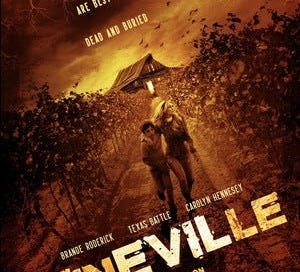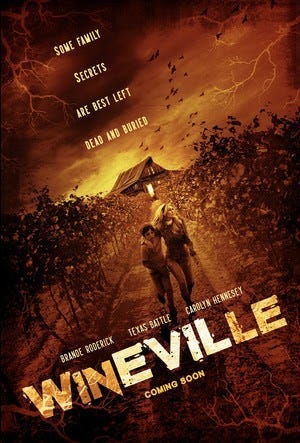Review: “Wineville” offers an homage and critical look at 70s horror film
The 1970s horror films were not only gory, but they also contained twisted narratives that were just as insane and gross. Many were also…
The 1970s horror films were not only gory, but they also contained twisted narratives that were just as insane and gross. Many were also based on horrifying true stories. Wineville is inspired by the slasher films of the 70s and the 1928 Wineville Chicken Coop Murders in the area known as Mira Loma today.
At first glance, Wineville feels like a parody of those slasher films. It ends up being a critical look at those films’ hypocrisy, while also introducing a new generation to a true crime history that had already spawned films in previous decades. The most recent include The Changeling (1998) directed by Clint Eastwood and starring Angelina Jolie. The murders were also referenced in shows like American Horror Story: Hotel in 2015. These references are refreshed in Wineville while also honoring the horror genre’s more seedy roots.
The film tells the story of Tess (Brande Roderick). After years away from the farm, she returns to sell the place after her father Edmund (Will Roberts) passes. The winery holds special horrifying memories for Tess, but it also supports the nearby town. The sale would disrupt those people. However, for her own reasons, Tess wants to sell the place and get far away from it.
Tess brought her son Walter (Keaton Roderick Cadrez) along with her. The sale gets stalled and they are stuck for a week. In the meantime, Tess’s mean aunt Margaret (Carolyn Hennesey) tries to convince Tess to keep the place “in the family”. Margaret’s adopted son Joe (Casey King) tries to help the case by showing Tess how he plans to revitalize the winery. None of their efforts get a chance to work because Tess has nightmarish memories of growing up on the farm.
She starts dating Sheriff Hicks (Texas Battle) as he closes in on the source of several abductions near Wineville Farm. Her budding love is not enough to stop Tess from plunging into her own flashbacks about the place. She stumbles upon some truths that are more grotesque than the bodies being dismembered at Wineville. Truths about Margaret, her father, Joe and the sexual abuse that ties them all together. Tess must survive the farm long enough to leave it behind forever.
Wineville also works to expose the hypocrisies that the 70 slashers stood on. When gay tourist Roger takes a solo tour of the farm with Joe, he gets more than he bargained for. However, when Roger is later eviscerated in the clutches of the killer, they preach about “sin” and “deviance”. The references hang as a bloody indictment of the morality that the killer is standing on while also highlighting the very misguided morality that 70s horror films stood on.
This hyperawareness of the slasher film genre is something that the star and director Brande Roderick.
“Knowing I wanted to tell a story centered on a mother who would do anything for her son, that I wanted to keep the story grounded in real human behavior (avoiding the supernatural), that it had to take place in a winery, and that I wasn’t afraid of going pitch dark, we worked up our tale of a seriously f-ed up family whose roots in evil go as deep as the roots of their ancient vines,” Roderick said in a director’s statement about the film.
Roderick also said, “We were equally influenced by such classic pictures as The Texas Chainsaw Massacre and The Last House on the Left as we were by more recent films like We Are What We Are and You Won’t Be Alone, knowing that we wanted a realistic, real-world look and tone to help us bring complicated, recognizable characters to life.”
Wineville streams on all platforms now. For more information, go to imdb.com.




